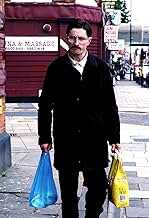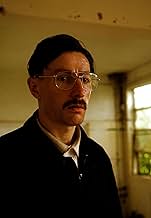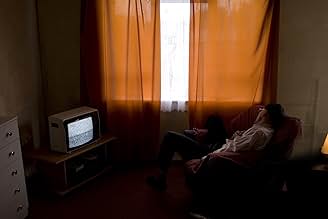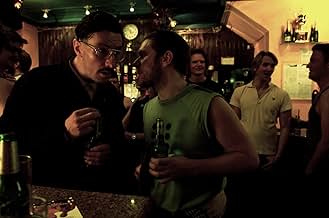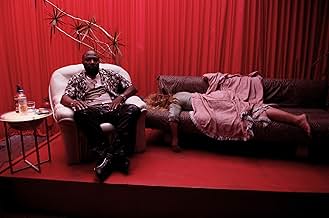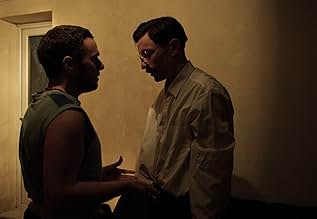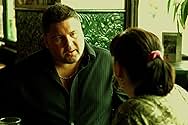NOTE IMDb
6,1/10
3,8 k
MA NOTE
Ajouter une intrigue dans votre langueA thriller centered on a serial killer in a rundown London suburb.A thriller centered on a serial killer in a rundown London suburb.A thriller centered on a serial killer in a rundown London suburb.
- Réalisation
- Scénario
- Casting principal
- Récompenses
- 1 victoire au total
Avis à la une
I've been wanting to see this for a while, but when I saw it on the listings for the Horror channel, I thought it couldn't be too much cop. How wrong I was...
Tony focuses on the disturbing, lonely and bleak existence of, well, Tony, as he wanders aimlessly through life with no goal, direction or ambition. Just another sad case, with a shambling walk, a bad haircut and even worse moustache, the sort of bloke you give a wide berth to as you wonder what he's wearing underneath his long coat, but one that would kill and dismember you as easily as you would peel a banana.
Peter Ferdinano is truly creepy as the main man, from the way he just stares at other people going about their business, to the awkward, stunted conversations he has to endure, through to when he suddenly and explosively reacts with extreme violence. Despite his hopeless and frequently vile existence though, it is almost difficult to not sometimes feel a tiny pang of sympathy for him. He has no job, no friends, lives in a squalid council flat and spends his days watching violent 80's action movies on VHS; he just truly does not know how to interact with other human beings... except when they are no longer living. Tony differs from other serial killer movies though, such as Henry: Portrait of a Serial Killer. In Henry, he is truly a monster, killing anyone that just happens to take his fancy or just happens to cross his path at the wrong time. With Tony, there is always a provocation of some sort that pushes him to the kill (granted, sometimes very slight), which is a true insight into a certain type of killers mind - able to operate in society at a base level, but unable to cope with rejection or threat (there is one murder in the film that I pretty much guarantee will make you cheer though!).
There is no denying the character here and the similarities with real-life serial killer Dennis Nilsen - the way he keeps corpses in his flat and has conversations with them for example, and the numerous references to 'the drains' and the smell. This all adds to the already realistic tone and pace of the movie, as it's not a case of 'this could happen', it more or less has.
Speaking of realism, one of the strongest points this movie offers is the acting. The lowlifes, scumbags, thugs, druggies and bullies that Tony meets on his wanderings are acted so well, that this is almost the most depressing slice of the film. Living in London, you see these people day in and day out. It's not glamorous and nothing is overacted. We all know a Paul (acted superbly by Ricky Grover): fat, loud, foul-mouthed council estate bully, and we've all seen the likes of the two low-life druggies Tony encounters early in the movie; always on the take, checking the change drop in phone boxes for spare coins while searching for their next hit.
There are some strong elements of gore in the movie, but it is never gratuitous, and certainly not there just for the hell of it. A terrifying aspect of Tony is the casual indifference he displays when either committing a murder or disposing of the corpse afterwards, yet more examples of Ferdinando's fine acting.
The film is quite short, and if you are the kind of viewer who wants answers to why things happen, then you will not find them here; this is like watching a short piece of someone's life, and then just moving on. Anyone abroad watching this would also probably be put off coming to London for life too. I wouldn't recommend this for date night.
I thoroughly enjoyed this film, but you won't be feeling good afterwards. It is almost too realistic, and will make you look twice at the strange, shambling man in the local supermarket staring at the dog biscuits for a bit too long.
Tony focuses on the disturbing, lonely and bleak existence of, well, Tony, as he wanders aimlessly through life with no goal, direction or ambition. Just another sad case, with a shambling walk, a bad haircut and even worse moustache, the sort of bloke you give a wide berth to as you wonder what he's wearing underneath his long coat, but one that would kill and dismember you as easily as you would peel a banana.
Peter Ferdinano is truly creepy as the main man, from the way he just stares at other people going about their business, to the awkward, stunted conversations he has to endure, through to when he suddenly and explosively reacts with extreme violence. Despite his hopeless and frequently vile existence though, it is almost difficult to not sometimes feel a tiny pang of sympathy for him. He has no job, no friends, lives in a squalid council flat and spends his days watching violent 80's action movies on VHS; he just truly does not know how to interact with other human beings... except when they are no longer living. Tony differs from other serial killer movies though, such as Henry: Portrait of a Serial Killer. In Henry, he is truly a monster, killing anyone that just happens to take his fancy or just happens to cross his path at the wrong time. With Tony, there is always a provocation of some sort that pushes him to the kill (granted, sometimes very slight), which is a true insight into a certain type of killers mind - able to operate in society at a base level, but unable to cope with rejection or threat (there is one murder in the film that I pretty much guarantee will make you cheer though!).
There is no denying the character here and the similarities with real-life serial killer Dennis Nilsen - the way he keeps corpses in his flat and has conversations with them for example, and the numerous references to 'the drains' and the smell. This all adds to the already realistic tone and pace of the movie, as it's not a case of 'this could happen', it more or less has.
Speaking of realism, one of the strongest points this movie offers is the acting. The lowlifes, scumbags, thugs, druggies and bullies that Tony meets on his wanderings are acted so well, that this is almost the most depressing slice of the film. Living in London, you see these people day in and day out. It's not glamorous and nothing is overacted. We all know a Paul (acted superbly by Ricky Grover): fat, loud, foul-mouthed council estate bully, and we've all seen the likes of the two low-life druggies Tony encounters early in the movie; always on the take, checking the change drop in phone boxes for spare coins while searching for their next hit.
There are some strong elements of gore in the movie, but it is never gratuitous, and certainly not there just for the hell of it. A terrifying aspect of Tony is the casual indifference he displays when either committing a murder or disposing of the corpse afterwards, yet more examples of Ferdinando's fine acting.
The film is quite short, and if you are the kind of viewer who wants answers to why things happen, then you will not find them here; this is like watching a short piece of someone's life, and then just moving on. Anyone abroad watching this would also probably be put off coming to London for life too. I wouldn't recommend this for date night.
I thoroughly enjoyed this film, but you won't be feeling good afterwards. It is almost too realistic, and will make you look twice at the strange, shambling man in the local supermarket staring at the dog biscuits for a bit too long.
In Tony, the title character (played very convincingly by Peter Ferdinando) is a soft-spoken, middle-aged nerd who enjoys old action movies. He's severely withdrawn from the world, unable to speak or relate to others, and has never worked a job in his life. One other important fact about Tony is his penchant for murder. In fact, Tony murders on a regular basis, whether it's druggies, men he picks up at gay bars, etc. At a mere 75 minutes, Tony never strives to be complex or hard to follow, but instead a simple portrayal of a simple killer who inability to connect with the world causes him to outburst so easily on those who confuse or anger him. When a young boy goes missing in town, the father immediately assumes it's Tony's doing and we watch as everything in Tony's life comes dangerously close to unfolding. Like I said, the film is simple yet sophisticated enough to be enjoyed mostly by the smarter movie watcher. Those looking for quick release won't get it here at all, despite the film's overly short runtime. A lot have compared it to the English answer to American classic Henry; Portrait of a Serial Killer and I couldn't agree more. It's dark, gritty, and covered in gloom, yet you somehow feel for this monstrous character. Overall, Tony is an excellent watch, one of the better "horror" films I've seen this year. Good film.
This film literally just drops you into Tony's life and then drops you right back out again. The fact that i was so desperate for more is a good sign that what I did see was great. And the ending itself was quite well done with a great piece of music that, with what had come before, had deeper meaning for me - in other words it made my skin crawl. Which again, is a good thing !
I am assessing by its very simple decor, locations and shots that this was quite low budget which is a credit to the film-makers, actors and script writers. The story is completely focused on the life of a man named Tony. One could describe him as a loner, depressed, socially awkward and well...passive. As we get to see Tony though we come to the conclusion that he is more than f#@ked up and has crossed the 'weird psychopath' line well and truly.
I mean the guy has a Paul Young cassette for Christ sake!!!
The movie hinges on tony, a mild, meek guy, actually being a serial killer that like some real life serial killers (Nielsen, Dahmer) seems to crave company and not to be socially rejected. There is clear connection to the mentioned real life killers in Tony as he attends gay bars and only seems to kill men. Though Tony has a life and identity of his own and for the brief time I did get to follow him i was into it.
Those seeking blood, guts, gore, action, jump scares forget it. Tony is a character study which lingers artistically and builds a layer of dread throughout instead of shoving everything in a sleek, fast edited production.
I am assessing by its very simple decor, locations and shots that this was quite low budget which is a credit to the film-makers, actors and script writers. The story is completely focused on the life of a man named Tony. One could describe him as a loner, depressed, socially awkward and well...passive. As we get to see Tony though we come to the conclusion that he is more than f#@ked up and has crossed the 'weird psychopath' line well and truly.
I mean the guy has a Paul Young cassette for Christ sake!!!
The movie hinges on tony, a mild, meek guy, actually being a serial killer that like some real life serial killers (Nielsen, Dahmer) seems to crave company and not to be socially rejected. There is clear connection to the mentioned real life killers in Tony as he attends gay bars and only seems to kill men. Though Tony has a life and identity of his own and for the brief time I did get to follow him i was into it.
Those seeking blood, guts, gore, action, jump scares forget it. Tony is a character study which lingers artistically and builds a layer of dread throughout instead of shoving everything in a sleek, fast edited production.
Tony watches action films on video cassette. He lives alone in a vertical street; a tower block in run down Dalston, a suburb of 'Broken Britain's' North London. Tony has not worked for over thirty years, and has no wish to do so. After all, he does have so much to do at home. This is at least what Tony tells his job centre adviser. This scene happens around the middle of the film, where we have already discovered that Tony has a penchant for murdering people in his flat. In protracted sequences throughout the film, we see Tony rigorously separate the body parts into their smallest components; wrapping them in newspaper and placed in corner-shop blue plastic bags for disposal. Whenever we follow Tony as he walks the streets, he is always carrying blue plastic bags. Tony has a lot of body parts to dump in the Thames.
Gerard Johnson's feature debut is a gritty serial killer movie, - clearly inspired by real-life British serial killer, Dennis Nilson (the Muswell Hill Murderer) - that follows a man completely alienated from his surroundings. He is Nilson in the early 1980's. He only watches action videos from that decade. Like Nilson, Tony (played with all the sweaty awkwardness needed for the character, by Peter Ferdinando) prefers to keep the bodies for company. He talks to them as they are placed on the sofa, or laid out in bed. Tony's life is a cycle of seconds of murder; hours of company; much time dismembering; and a long, perpetual task of bit-by-bit disposal.
Tony picks up men in gay bars. He persuades a couple of smack-heads to go back to his flat. A boy of 10 years goes missing on the estate. A large, stereotypical, aggressive working-class man targets Tony as an obvious target: His appearance could resemble that Daily Mirror image of the bespectacled, moustachiod loner, that so associated with a pederast.
Despite the grim, and inescapable bleakness of the film, director Johnson, finds room to add humour. The film resembles, stylistically, that of John McNaughton's excellently unresolved Henry: Portrait of a Serial Killer (1986). The same concept carries into this film. The life- goes-on attitude. Tony is a ghost in the narrative. Yes, he is the protagonist. But he only exists in his insular world. The space he has dwelt in for "ages". Outside he drifts through the busy streets unnoticed; he fades into obscurity amongst regular people. Anonymously carrying plastic bags of internal organs.
The film is self consciously 1970's in its approach; both stylistically, and thematically. in the latter of those two, '70's horror cinema tended to the ambiguity left by rare conclusions. For the first, this is low budget cinema. However, this is certainly made with style; it is highly competent filmmaking. We know immediately from the start of the film that the filmmakers influences in the golden-years-of-exploitation- cinema are a part of this picture; the typeface of the movie title 'Tony' are reminiscent of the title cards for the American exploitationers this really wants to homage. It is an incredibly well made contribution to the likes of Jeff Gillen and Allan Ormsby's Deranged (1974). However, Tony does not highlight the grotesque, like in much of the films it might be 'riffing' on.
Johnson's film looks like it could possibly fit into the working-class visuals of a kitchen sink drama - only through the eyes of a cold- hearted killer. Although, whilst we are repelled by Tony, do we also feel pathos for a character so out of touch with the world, that he will try and persuade a Chinese man selling DVDs on the street to sell him outmoded video cassettes? Tony is entirely disenfranchised. Because of this separation from reality, Tony is able to pass unseen. Or perhaps, like Mary Harron's American Psycho (2000), this is all imagined. (By the way, I don't believe at all that this was all imagined; that's just how I ended it.)
www.the-wrath-of-blog.blogspot.com
Gerard Johnson's feature debut is a gritty serial killer movie, - clearly inspired by real-life British serial killer, Dennis Nilson (the Muswell Hill Murderer) - that follows a man completely alienated from his surroundings. He is Nilson in the early 1980's. He only watches action videos from that decade. Like Nilson, Tony (played with all the sweaty awkwardness needed for the character, by Peter Ferdinando) prefers to keep the bodies for company. He talks to them as they are placed on the sofa, or laid out in bed. Tony's life is a cycle of seconds of murder; hours of company; much time dismembering; and a long, perpetual task of bit-by-bit disposal.
Tony picks up men in gay bars. He persuades a couple of smack-heads to go back to his flat. A boy of 10 years goes missing on the estate. A large, stereotypical, aggressive working-class man targets Tony as an obvious target: His appearance could resemble that Daily Mirror image of the bespectacled, moustachiod loner, that so associated with a pederast.
Despite the grim, and inescapable bleakness of the film, director Johnson, finds room to add humour. The film resembles, stylistically, that of John McNaughton's excellently unresolved Henry: Portrait of a Serial Killer (1986). The same concept carries into this film. The life- goes-on attitude. Tony is a ghost in the narrative. Yes, he is the protagonist. But he only exists in his insular world. The space he has dwelt in for "ages". Outside he drifts through the busy streets unnoticed; he fades into obscurity amongst regular people. Anonymously carrying plastic bags of internal organs.
The film is self consciously 1970's in its approach; both stylistically, and thematically. in the latter of those two, '70's horror cinema tended to the ambiguity left by rare conclusions. For the first, this is low budget cinema. However, this is certainly made with style; it is highly competent filmmaking. We know immediately from the start of the film that the filmmakers influences in the golden-years-of-exploitation- cinema are a part of this picture; the typeface of the movie title 'Tony' are reminiscent of the title cards for the American exploitationers this really wants to homage. It is an incredibly well made contribution to the likes of Jeff Gillen and Allan Ormsby's Deranged (1974). However, Tony does not highlight the grotesque, like in much of the films it might be 'riffing' on.
Johnson's film looks like it could possibly fit into the working-class visuals of a kitchen sink drama - only through the eyes of a cold- hearted killer. Although, whilst we are repelled by Tony, do we also feel pathos for a character so out of touch with the world, that he will try and persuade a Chinese man selling DVDs on the street to sell him outmoded video cassettes? Tony is entirely disenfranchised. Because of this separation from reality, Tony is able to pass unseen. Or perhaps, like Mary Harron's American Psycho (2000), this is all imagined. (By the way, I don't believe at all that this was all imagined; that's just how I ended it.)
www.the-wrath-of-blog.blogspot.com
Tony is a dark character study focusing on a week in the life of Tony, a British serial killer living in a London tower block. A socially awkward individual, Tony kills because it seems to be his only way to resolve difficult social situations. It is easier for him to commit murder than to relate to other people.
To a certain extent, the film's examination of Tony resembles the 1980s film, Henry: Portrait of a Serial Killer. Peter Ferdinando's performance rivals that of Michael Rooker in the latter film, giving Tony depth and sympathy. However, the film has a class context that sets it apart from the earlier work.
Paralleling Tony's bleak existence is the blighted section of London he lives in. Walking aimlessly through poor neighborhoods and interacting with their inhabitants, Tony's behavior comes to seem an understandable reaction to his social environment. Indeed, many of the people he encounters come across as even more savage in their own ways, whether through overt aggression or bureaucratic indifference.
The film does have some flaws that prevent it from being a true classic. There are a number of scenes dedicated to establishing Tony's lack of social skills, which at times come across as overkill. Given that the film originated as a short film, these scenes seem like filler meant to bring it to feature length. Nevertheless, this British film is definitely worth a rent.
To a certain extent, the film's examination of Tony resembles the 1980s film, Henry: Portrait of a Serial Killer. Peter Ferdinando's performance rivals that of Michael Rooker in the latter film, giving Tony depth and sympathy. However, the film has a class context that sets it apart from the earlier work.
Paralleling Tony's bleak existence is the blighted section of London he lives in. Walking aimlessly through poor neighborhoods and interacting with their inhabitants, Tony's behavior comes to seem an understandable reaction to his social environment. Indeed, many of the people he encounters come across as even more savage in their own ways, whether through overt aggression or bureaucratic indifference.
The film does have some flaws that prevent it from being a true classic. There are a number of scenes dedicated to establishing Tony's lack of social skills, which at times come across as overkill. Given that the film originated as a short film, these scenes seem like filler meant to bring it to feature length. Nevertheless, this British film is definitely worth a rent.
Le saviez-vous
- AnecdotesNone of the cast members were told anything about this film outside of their scenes with Tony.
- ConnexionsReferences Le faucon maltais (1941)
Meilleurs choix
Connectez-vous pour évaluer et suivre la liste de favoris afin de recevoir des recommandations personnalisées
- How long is Tony?Alimenté par Alexa
Détails
- Date de sortie
- Pays d’origine
- Sites officiels
- Langue
- Aussi connu sous le nom de
- Tony: London Serial Killer
- Lieux de tournage
- Sociétés de production
- Voir plus de crédits d'entreprise sur IMDbPro
- Durée1 heure 16 minutes
- Couleur
- Rapport de forme
- 1.85 : 1
Contribuer à cette page
Suggérer une modification ou ajouter du contenu manquant



